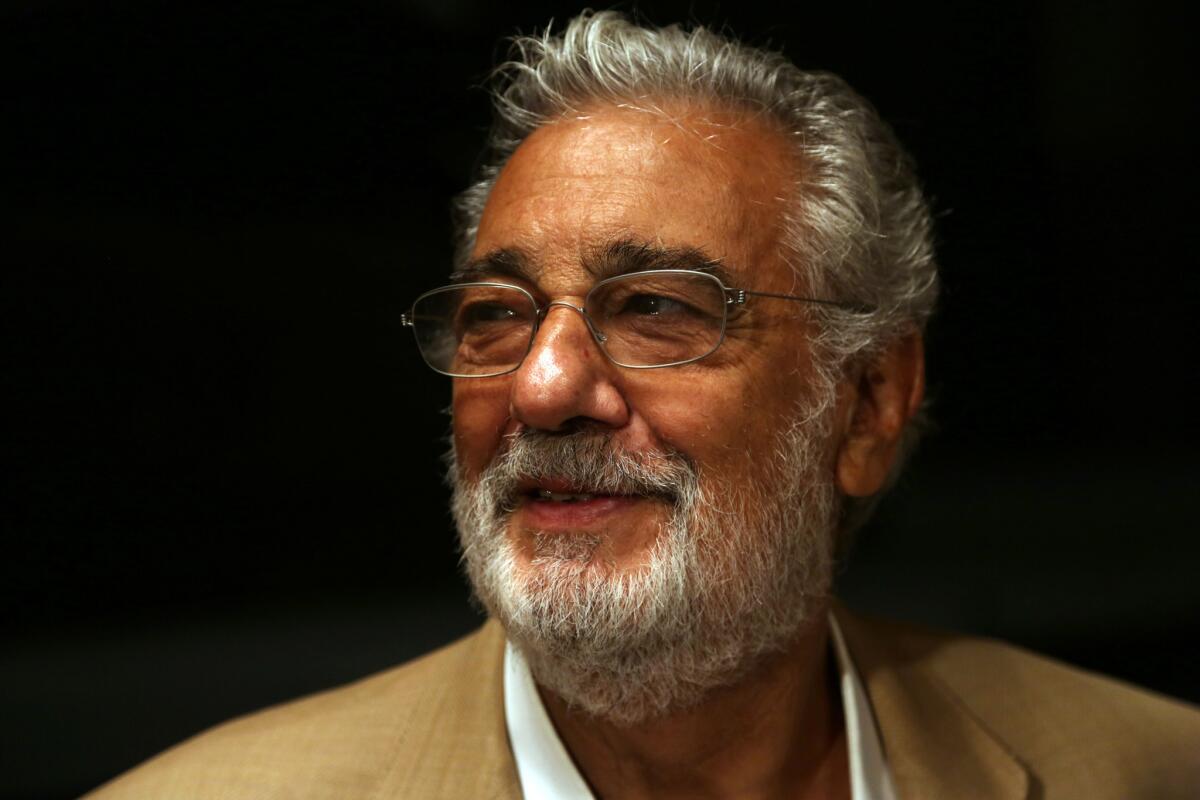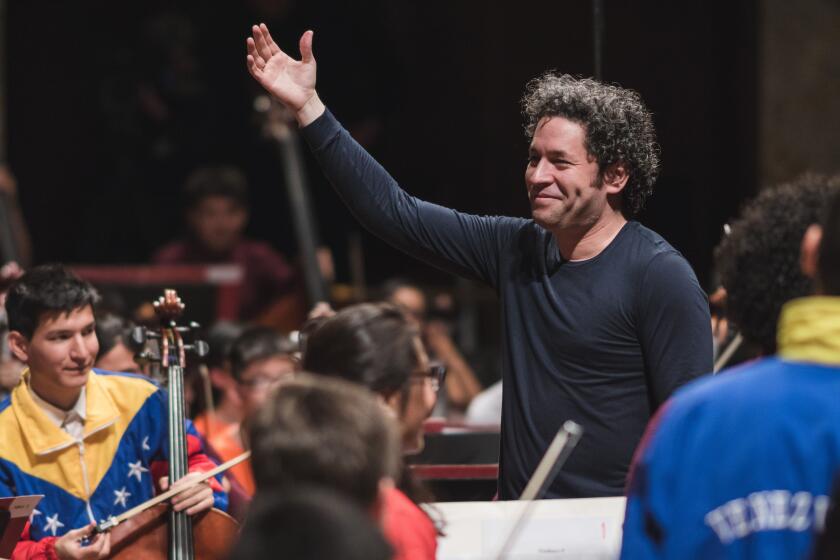Plácido Domingo, a sexual harassment investigation and the threat to his 60-year legacy

- Share via
Over his 60-year career, Plácido Domingo — general director of Los Angeles Opera and living legend of global proportions — has been described as the Energizer bunny of opera.
At 78, Domingo has performed more than 4,000 times, recorded more than 100 albums, navigated the switch from tenor to baritone and even inspired the operatic character Placido Flamingo on “Sesame Street.” Last year, Domingo achieved a seemingly impossible feat: singing his 150th role.
When asked how he does it, Domingo referred back to his motto: “I rest, I rust.”
But new allegations that the opera superstar sexually harassed women throughout his storied career are threatening to tarnish that gilded legacy.
Eight singers and one dancer have told the Associated Press they were sexually harassed by Domingo in the 1980s, ’90s and early 2000s. The women said Domingo made unwanted sexual advances and tried to pressure them into sexual relationships. When they refused those advances, many said, they stopped getting hired for Domingo productions.
A mezzo-soprano in the L.A. Opera chorus in 1988 told the AP she met Domingo during a rehearsal of “The Tales of Hoffmann,” in which she was to kiss him in an orgy scene. She recalled a sloppy, wet kiss after which Domingo whispered in her ear, “I wish we weren’t onstage.”
Over the next three years, the woman said, Domingo was uncomfortably affectionate, calling her at home, slipping a hand around her waist when they crossed backstage and entering dressing rooms uninvited.
In 1991, she told AP, “I finally gave in and slept with him. I ran out of excuses. It was like, ‘OK, I guess this is what I have to do.’” After one sexual encounter with him at the Biltmore Hotel downtown and another at Domingo’s L.A. apartment, she cut off physical contact and saw her career with L.A. Opera suffer, she said.
Other women spoke of being stalked backstage, touched without permission, and forced to fend off chronic romantic overtures. Although none of the women offered documentation, such as phone messages, the AP said it spoke to almost three dozen singers, dancers, musicians, backstage staffers and others who said they witnessed “inappropriate sexually tinged behavior” and that Domingo “pursued younger women with impunity,” the article said.
L.A. Opera said Tuesday that it will “engage outside counsel” to investigate the accusations. “We believe all employees and artists should be treated respectfully and feel safe and secure within their work environment,” the company said in a terse, five-sentence statement.
The statement emphasized that Domingo has been “a dynamic creative force in the life of L.A. Opera and the artistic culture of Los Angeles for more than three decades. Nevertheless, we are committed to doing everything we can to foster a professional and collaborative environment where all our employees and artists feel equally comfortable, valued and respected.”
Domingo issued a statement to the AP, saying, “The allegations from these unnamed individuals dating back as many as 30 years are deeply troubling, and as presented, inaccurate.
“Still, it is painful to hear that I may have upset anyone or made them feel uncomfortable — no matter how long ago and despite my best intentions. I believed that all of my interactions and relationships were always welcomed and consensual. People who know me or who have worked with me know that I am not someone who would intentionally harm, offend or embarrass anyone.
“However, I recognize that the rules and standards by which we are — and should be — measured against today are very different than they were in the past. I am blessed and privileged to have had a more than 50-year career in opera and will hold myself to the highest standards.”
Domingo’s statement quickly drew condemnation on social media, with some attacking his implied defense that the behavior detailed by AP could be excused as the culture of an earlier, more permissible era.
Ian Barnard, who identified himself as an L.A. Opera subscriber, said he was offended by the statement. “We are not only disgusted by Domingo’s abusive behavior,” Barnard tweeted, “but also by the failure of L.A. Opera’s board of directors (or anyone else) to stop this behavior.”
The Times asked L.A. Opera for specifics on who will lead the investigation and if the company had settled any harassment lawsuits during Domingo’s tenure, among other questions. The company responded by referring to its earlier statement.
Born in Spain, Domingo grew up singing zarzuelas onstage in Mexico with his parents. After singing professionally in Mexico and Israel, he moved to the U.S. and made his debut with the New York City Opera in 1965. In the 1960s he also married Marta Ornelas, now a regular director of L.A. Opera productions.
Domingo was among the founders of Music Center Opera (which later became Los Angeles Opera) in 1986. The singer became an artistic advisor and, importantly, the face of the company. In the 1980s, Domingo also made his conducting debut at the Metropolitan Opera in New York and found crossover pop success as part of the Three Tenors with Luciano Pavarotti and José Carreras. In the early 1990s, he founded Operalia, the World Opera Competition, to discover young singers.
But all those accomplishments have quickly faded in the wake of the AP report, for which most of the sources were anonymous. Despite Domingo’s reference to “unnamed accusers,” one source in the AP article did allow her name to be used: Patricia Wulf, who sang with Domingo at what is now the Washington National Opera in Washington, D.C.
Wulf said after she exited the stage during performances, Domingo would come up to her, “put his face right in my face, lower his voice and say, ‘Patricia, do you have to go home tonight?’ … It got to a point that I would come offstage and try to slither behind a pillar, and he would still find a way to get to me.”
Domingo did not physically touch her, Wulf said, but the behavior created an atmosphere of fear. Her husband, Richard Lew, told the AP that his wife complained about the behavior at the time and was visibly upset by it. A former male colleague of Wulf’s also recalled Wulf’s discomfort and said he accompanied her to her car at work because she was scared to walk alone.
Another female singer recalled being asked repeatedly to work on an aria at Domingo’s apartment. After avoiding the requests for weeks, she relented.
“He sat down at the grand piano and we really did sing this aria, and we worked on it,” she told the AP. “And he gave me coaching and was very complimentary.”
But then, she said, “When it was over, he stood up and slid his hand down my skirt, and that was when I had to get out of there.”
In the coming months, Domingo had been scheduled to perform across the U.S. and Europe, but on Tuesday the Philadelphia Orchestra rescinded its invitation to appear at its opening night concert Sept. 18, saying that it’s “committed to providing a safe, supporting, respectful and appropriate environment.”
San Francisco Opera canceled an Oct. 6 concert with Domingo celebrating the 50th anniversary of his company debut. Although the alleged incidents did not happen at San Francisco Opera, the company said in a statement that it is “committed to its strong anti-sexual harassment policy and requires all company members to adhere to the highest standards of professional conduct.”
Organizers of the esteemed Salzburg Festival in Austria stood by Domingo, saying he is welcome to sing in Verdi’s “Luisa Miller” as planned in August. Domingo also was still scheduled to sing in the Met’s “Macbeth” in September and “Madama Butterfly” in November.
The L.A. Opera season starts Sept. 14 with noted director Barrie Kosky’s production of “La Bohème.” The company would not say if the allegations against Domingo would affect the opening or the rest of the season.
More to Read
The biggest entertainment stories
Get our big stories about Hollywood, film, television, music, arts, culture and more right in your inbox as soon as they publish.
You may occasionally receive promotional content from the Los Angeles Times.











